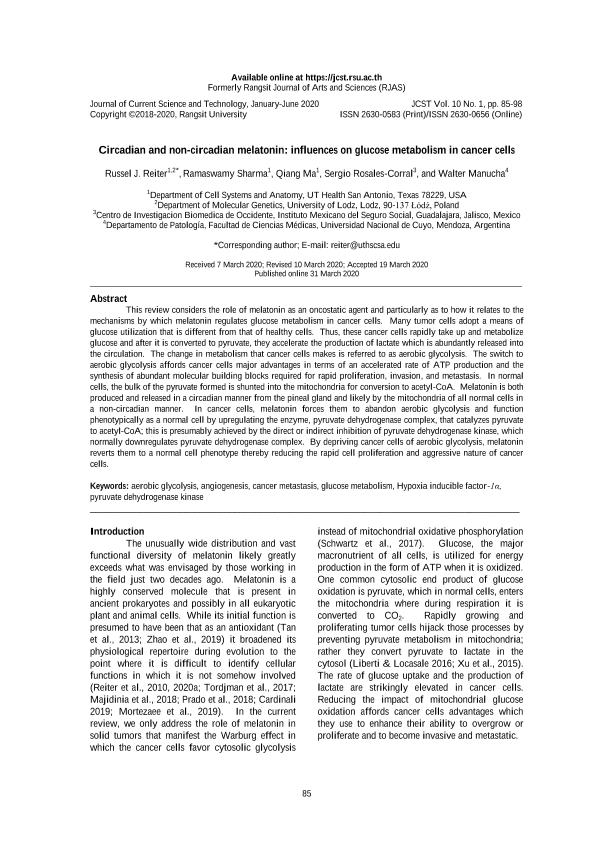Mostrar el registro sencillo del ítem
dc.contributor.author
Reiter, Russel

dc.contributor.author
Sharma, Ramaswamy
dc.contributor.author
Ma, Qiang
dc.contributor.author
Rosales Corral, Sergio
dc.contributor.author
Manucha, Walter Ariel Fernando

dc.date.available
2021-08-24T15:59:36Z
dc.date.issued
2020-01
dc.identifier.citation
Reiter, Russel; Sharma, Ramaswamy; Ma, Qiang; Rosales Corral, Sergio; Manucha, Walter Ariel Fernando; Circadian and non-circadian melatonin: Influence on glucose metabolism in cancer cells; Rangsit University; Journal of Current Science and Technology; 10; 1; 1-2020; 85-98
dc.identifier.issn
2077-0383
dc.identifier.uri
http://hdl.handle.net/11336/138793
dc.description.abstract
This review considers the role of melatonin as an oncostatic agent and particularly as to how it relates to the mechanisms by which melatonin regulates glucose metabolism in cancer cells. Many tumor cells adopt a means of glucose utilization that is different from that of normal cells. Thus, these cancer cells rapidly take up and metabolize glucose and after it is converted to pyruvate, they accelerate the production of lactate which is abundantly released into the circulation. The change in metabolism that cancer cells makes is referred to as the Warburg effect, or aerobic glycolysis. The switch to aerobic glycolysis affords cancer cells major advantages in terms of an accelerated rate of ATP production and the synthesis of abundant molecular building blocks required for rapid proliferation, invasion, and metastasis. In normal cells, the bulk of the pyruvate formed is shunted into the mitochondria for conversion to acetyl-CoA. Melatonin forces cancer cells to abandon aerobic glycolysis and function with a normal cell phenotype. The oncostatic agent, melatonin, does this by upregulating the enzyme, pyruvate dehydrogenase complex, that ensures pyruvate to acetyl-CoA metabolism; this is presumably achieved by the direct or indirect inhibition of pyruvate dehydrogenase kinase, which normally downregulates pyruvate dehydrogenase complex. By depriving cancer cells of aerobic glycolysis, melatonin converts them to a normal cell phenotype which reduces the rapid cell proliferation and aggressive nature of cancer cells.
dc.format
application/pdf
dc.language.iso
eng
dc.publisher
Rangsit University
dc.rights
info:eu-repo/semantics/openAccess
dc.rights.uri
https://creativecommons.org/licenses/by-nc-sa/2.5/ar/
dc.subject
AEROBIC GLYCOLYSIS
dc.subject
ANGIOGENESIS
dc.subject
CANCER METASTASIS
dc.subject
GLUCOSE METABOLISM
dc.subject
HYPOXIA INDUCIBLE FACTOR-1Α
dc.subject
PYRUVATE DEHYDROGENASE KINASE
dc.subject.classification
Farmacología y Farmacia

dc.subject.classification
Medicina Básica

dc.subject.classification
CIENCIAS MÉDICAS Y DE LA SALUD

dc.title
Circadian and non-circadian melatonin: Influence on glucose metabolism in cancer cells
dc.type
info:eu-repo/semantics/article
dc.type
info:ar-repo/semantics/artículo
dc.type
info:eu-repo/semantics/publishedVersion
dc.date.updated
2021-04-28T20:11:33Z
dc.identifier.eissn
2630-0656
dc.journal.volume
10
dc.journal.number
1
dc.journal.pagination
85-98
dc.journal.pais
Tailandia

dc.journal.ciudad
Patumthani
dc.description.fil
Fil: Reiter, Russel. University Of Lodz; Argentina
dc.description.fil
Fil: Sharma, Ramaswamy. No especifíca;
dc.description.fil
Fil: Ma, Qiang. No especifíca;
dc.description.fil
Fil: Rosales Corral, Sergio. Instituto Mexicano del Seguro Social; México
dc.description.fil
Fil: Manucha, Walter Ariel Fernando. Consejo Nacional de Investigaciones Científicas y Técnicas. Centro Científico Tecnológico Conicet - Mendoza. Instituto de Medicina y Biología Experimental de Cuyo; Argentina
dc.journal.title
Journal of Current Science and Technology
dc.relation.alternativeid
info:eu-repo/semantics/altIdentifier/url/https://jcst.rsu.ac.th/volume/10/number/1/article/181
dc.relation.alternativeid
info:eu-repo/semantics/altIdentifier/doi/http://dx.doi.org/10.14456/jcst.2020.9
Archivos asociados
